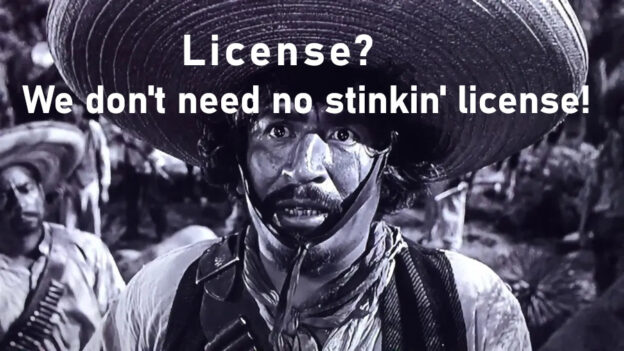There is a lot of confusion about Wizards of the Coast, Inc. (WotC) and the Open Game License (OGL). Some people seem to think that if you make a game that is in any way similar to products made by WotC, or some other game, you have to have permission, or a license to do so. Unlike the complex task of cutting hair, doing nails, fixing plumbing, etc., you do not need a license or permission to write games. I think that for most projects based upon the OSR or any project with game mechanics similar to other games, there is no need to use any OGL, license, or obtain any permission other than that required by the ‘fair use’ doctrine and common courtesy.
As I suggested in Is it OK to “steal” game rules or mechanics?, game rules generally cannot be protected, only the actual words and images (copyright), trademarks and tradenames, and occasionally patents for really unique processes and game items. So, unless you are just copying another source word-for-word, which is what the WotC OGL 1.0a allows you to do, you do not need to worry about copyright or getting permission or a license to use copyright protected content.
The ‘fair use’ doctrine does allow for the use of copyright protected material under limited circumstances:
Notwithstanding the provisions of sections 17 U.S.C. § 106 and 17 U.S.C. § 106A, the fair use of a copyrighted work, including such use by reproduction in copies or phonorecords or by any other means specified by that section, for purposes such as criticism, comment, news reporting, teaching (including multiple copies for classroom use), scholarship, or research, is not an infringement of copyright. In determining whether the use made of a work in any particular case is a fair use the factors to be considered shall include:
- the purpose and character of the use, including whether such use is of a commercial nature or is for nonprofit educational purposes;
- the nature of the copyrighted work;
- the amount and substantiality of the portion used in relation to the copyrighted work as a whole; and
- the effect of the use upon the potential market for or value of the copyrighted work.
The fact that a work is unpublished shall not itself bar a finding of fair use if such finding is made upon consideration of all the above factors.
17 U.S.C. § 107
In effect the ‘fair use’ doctrine allows for the word-for-word use of copyright protected material in limited circumstances and properly cited. Including brief properly cited quotes of someone else’s work is fine, including vast amounts of that work without the author’s permission may not be wise.
But remember, only the words are protected by copyright, not the mechanics, formulas, systems, processes, etc. If you take a set of rules and use the exact same mechanics, but you do not copy the text, images, trade name, or trademark then there is no violation of copyright, and you do not need any permission. Nor do you have to provide any attribution at all, but courtesy would suggest you do so.
It is possible that certain unique process ‘tech’ used in a game might be protected under patent law for some ‘process patents’, whether those ‘processes’ are filed or not. However, such ‘process patents’ have a very limited time period for protection (20 years at most) after which they become part of the public domain. Such ‘process patents’ can also be abandoned by the maker if others use the process and the maker does not legally defend it within the statutory period of limitations to bring suit.
The OGL 1.0a created by WotC allowed the user to copy specific protected content word-for-word as long as you followed the terms of the license, which is more strict in some ways than traditional copyright law, trademark and tradename law, patent law, etc.
If you are not copying word-for-word from protected content, using the tradename or trademark of another author, or using mechanics, formulas, or other game systems that are currently protected under patent law (very unlikely), there is no reason to use ANY licensing system.
